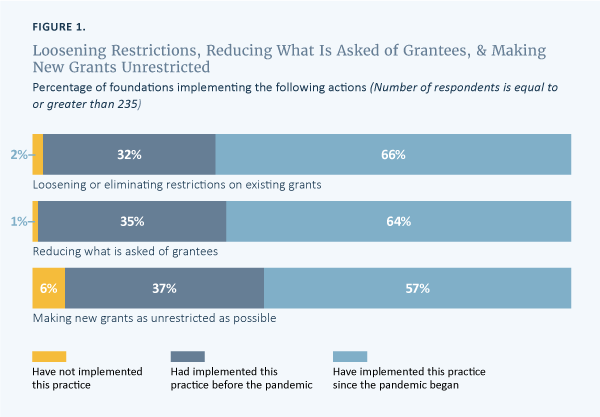Nonprofits and funders alike have long called on foundations to be more flexible and responsive, to provide more unrestricted funding, to reduce what they ask of grantees, and to build more trusting relationships. In 2020, these calls for change only intensified in a time of immense challenge for nonprofits and the people and communities they serve.
Have foundations responded to these calls with newfound urgency? And if so, is that response merely a momentary adjustment? Or will the crises of 2020 spur substantive, long-term change in how funders approach their work?
CEP surveyed and interviewed foundation leaders to find out. Foundations Respond to Crisis: Toward Greater Flexibility and Responsiveness? reveals that foundations say they are loosening grant restrictions, providing more unrestricted funding, and reducing what they ask of grantees. Many plan to continue these practices in the future, though to a lesser degree than during their pandemic response.
Findings in this report are based on survey data gathered from 236 foundations — 170 of which signed the pledge hosted by the Council on Foundations to act urgently in response to COVID-19, and 66 of which had not — as well as in-depth interviews with leaders of 41 foundations that signed the pledge. All data was collected between June and August 2020.
This study is the final in a series of three reports from CEP examining the extent to which staffed foundations have changed their practices in response to calls for change to meet the unprecedented challenges of 2020.
The Ford Foundation provided funding to support this research, along with Charles and Lynn Schusterman Family Foundation, David and Lucile Packard Foundation, Raikes Foundation, Weingart Foundation, and the William and Flora Hewlett Foundation.
Data collection instruments used to gather information for this report are available here.
For more information about CEP’s current Grantee Voice Panel, please click here.
December 2020




